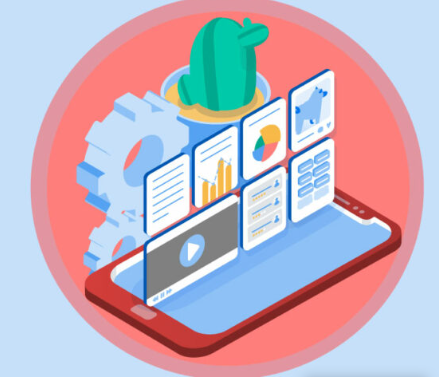With the growth of mobile phones, there has been an increase in the need for mobile-friendly apps. To satisfy this demand, numerous App Developers UK are creating and launching apps for their mobiles. But, optimizing a mobile app to work on different platforms can be challenging, especially with the many other platforms and devices to consider. To ensure that your app works effectively across all platforms and devices, it is vital to know the specific specifications and limitations.

Considerate Different Platforms:
Table of Contents
The first step includes tablets, smart watches, smartphones, and other mobile devices. Every device comes with its resolution, screen size, and aspect ratio, and each platform comes with its operating system as well as software and user interface. Knowing these differences can help UK app developerscreate and build an optimized application for every technology and device.
Utilizing Platform-Specific Features:
Another crucial aspect of optimizing your mobile application for various platforms is using features specific to that platform. Therefore, to ensure that your app is taking maximum advantage of the capabilities and features of each forum, it is recommended to employ tools and techniques specific to platforms to develop and design your application.
Testing and Debugging Your App:
Once your application has been created and developed, it is essential to thoroughly test it across every system and device to make sure it functions as you expect. This includes testing compatibility, performance, and functionality and debugging any issues that could occur. To facilitate this process, you can employ software and tools that automate testing that will aid you in testing your application on various platforms and devices faster and more effectively.
Using Cross-Platform Development Tools:
An excellent method to optimize your mobile app to work on different devices is to employ multi-platform tools for development. These tools let you create the app’s code one time and then install it on a variety of platforms, such as iOS, Android, and other platforms. This could save you time and money compared to creating separate applications for each platform and ensuring your application is designed for every device.
Considering Device Performance:
Another aspect to consider when optimizing your mobile application for various devices is the device’s performance. Different devices come with varying specifications for hardware, such as processors, memory, processors, and storage capacity. This can affect the efficiency of your application. To ensure your application functions smoothly across all devices, take note of these differences and adjust your app to take advantage of these differences.
Implementing Platform-Specific Optimizations:
You could apply specific optimizations for each platform to make your app more efficient for various platforms. When you implement these particular optimizations for each platform, it is possible to ensure that your app is optimized for every device and offers a fantastic user experience.
Using Analytics:
Analytics tools give you valuable insight into how your app is utilized, such as which devices and platforms customers use, the features they use the most, and how they engage with your app. This will enable apps developers UK to make changes and improve your app’s performance for various devices according to their preferences and requirements.
Pros of Optimizing Apps before Launch:
Optimizing apps is essential as we must improve the app in line with the guidelines for the app store. This offers many advantages that could benefit the mobile system and increase battery endurance and performance.
1. Increases Speed:
Apps start and shut down faster since they are optimized before launching them. However, if apps are optimized following their launch, they’ll require more RAM, which can slow the device’s speed and reduce the app’s speed.
The Android apps that are installed include an extension of .apk, but, in addition, some files have the extension. Codex is downloaded automatically. They are part of the optimized app before the application starts. Files with this extension accelerate the process of optimizing.
2. Preloads App Part:
As the files in Codex are included, this extension aids in accelerating the booting process. In addition, it is a set of files used to complete an optimization process. All this is due to optimization results in preloading a portion of an application. This allows the system to launch apps in a much shorter period.
The preloading process of an app will benefit both the system and the user to a large degree since it eliminates the issue of apps freezing when the app is launched. It also improves the efficiency of overall operation on the Android system. Android app development services have taken advantage of this to continue creating user-friendly applications.
3. Make the App Execution Ready:
Certain parts of the application are loaded as part of the optimization process occurs. Ultimately, it will be ready for execution when the user turns to the system.
The entire process is carried out until the launch of a specific app in the background, which allows users to use their phones. In contrast, the app that covers a substantial portion of memory is developed in the environment.
Before the release of ART, the applications were optimized just before the start of execution, which decreased the performance and speed of the device.
4. Increase in Battery Life:
Optimizing the app before launch puts less stress on RAM all at once and saves battery. However, if the app is improved after the launch date, it separately utilizes RAM and impacts the battery. In this situation, the battery will be drained quicker since the device uses the processor to optimize the application.
The prior Optimization of these apps can reduce the burden of the gadget, thereby making batteries last longer.
5. Adds App Standby Buckets:
If we optimize the app before its launch, the processor will add the app not being used into the bucket for standby. This reduces the processing in the background of the application. This helps conserve battery speeds and lets the device perform at its peak.
If the app isn’t correctly optimized before launch, it won’t be able to get added to the standby bucket. Also, if the app isn’t optimized, it will take up an area in the background, affecting its performance.
6. Clears the RAM:
If the RAM is cleared, it automatically becomes more efficient, faster, and smooth. Clearing the RAM is removing the unneeded space from your system’s memory. This also means that there is room for new processes to be developed in a quick process.
The primary purpose of Optimization is clearing out RAM to ensure that the system can run without hassle. All of the top firms for mobile application development are trying to make the apps more RAM user-friendly.

Conclusion:
Optimizing mobile apps for various devices is an arduous and challenging task. However, ensuring your app can function across all platforms and devices is vital.
You understand the specific needs as well as limitations of each platform and device by employing responsive design methods and features that are specific to the platform as well as conducting tests and debugging of your application, constantly upgrading and enhancing it so that your mobile application is optimized for every device and platform offering an enjoyable and seamless experience for your customers.
When you consider factors like resolution and screen size and features specific to platforms, including device performance, feedback from users, and making use of tools like cross-platform development as well as analytics, you can make sure that your mobile application stands out and delivers a seamless, satisfying experience for all users.
FAQS:
What is the meaning of mobile application optimization?
The Optimizing app’s process in the app store enhances mobile apps to rank higher on an app store’s search results. In addition, the increased visibility will result in more visitors to your app’s website in your app’s store.
What happens when I optimize my apps?
It helps conserve battery power, helps speed up the process, and makes the device work at its peak. If the app isn’t optimized before launch, it can’t get added to the bucket for standby. If the app isn’t optimized, it takes up the screen, which impacts the device’s performance.
What can you do to optimize performance on phones?
Automatic Optimization is a device-care feature that lets you know whether your Samsung phone is functioning well and then optimizes it to enhance performance and eliminate bugs. This feature was created to avoid typical Android phone issues such as crashes, flickering screens, slow user interface, and more.
